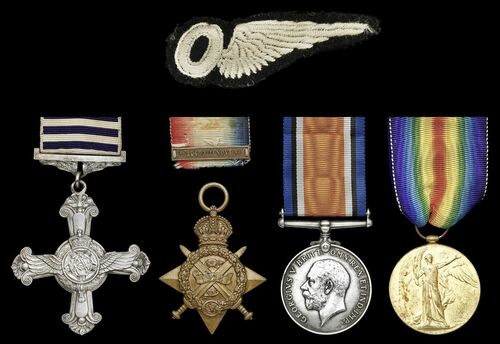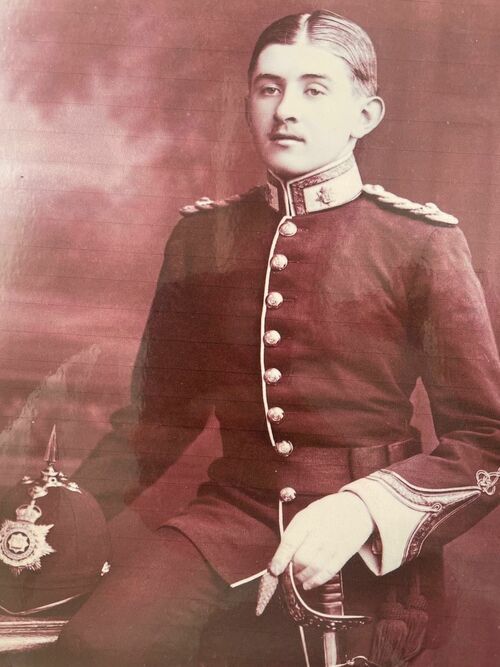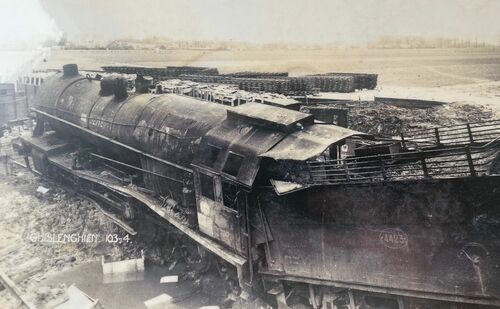Auction: 23003 - Orders, Decorations and Medals
Lot: 314
An outstanding Great War D.F.C. group of four awarded to Lieutenant F. M. Loly, Royal Flying Corps and Royal Air Force, late East Surrey Regiment
An 'Old Contemptible' who served in Flanders in the early days of the Great War, Loly was wounded in action at Richebourg on 16 May 1915 whilst attached to the South Staffordshire Regiment; he was soon back in action and survived the sinking of the Arabia off Mudros
He thence went skyward and earned 'Ace' status, notching up six 'kills' before War's end and a second wounding for good measure
Distinguished Flying Cross, G.V.R., in its John Pinches case of issue with original horizonal-striped riband; 1914 Star, clasp (Lieut: F. M. Loly. E. Surr: R.); British War and Victory Medals (Lieut. F. M. Loly. R.A.F.), good very fine (4)
D.F.C. London Gazette 11 February 1919:
'This officer has done over two hundred hours' war flying as an Observer. On 18th October [1918], accompanying the leader of a special bombing raid, he descended in his heavy bombing machine to 2,500ft above an enemy railway station. From this altitude, unusually low for the type of machine, and in face of heavy fire, he, with remarkable coolness and precision, aimed his bombs; one fell on the station buildings, and another on an ammunition train, which was completely destroyed.'
Frank Masterman Loly was born on 2 November 1894 at Bromley, Kent and was educated at Haileybury College. Whilst there he joined the Cadet Corps and was thence commissioned 2nd Lieutenant in the 3rd Battalion, East Surrey Regiment in September 1912.
With the outbreak of the Great War, Loly was mobilised as a Lieutenant with the 1st Battalion, East Surrey Regiment and served in France from 19 September 1914. Loly was taken sick and hospitalised on 25 October 1914 and on recovery was then attached to the 1st Battalion, South Staffordshire Regiment from 7 December 1914. Hospitalised again owing to sickness on 9 January 1915, he would return to duty on the 18 January, only to be hospitalised again from 1-10 February 1915. Having returned to duty, he was then wounded in action whilst still attached to the South Staffordshires on 16 May 1915, when he was wounded in the left shoulder by shell fire at the Battle of Richebourg. This time he was hospitalised and evacuated to England on 17 May 1915.
Loly recovered from his wound and was then posted to duty as a Lieutenant with a Garrison Battalion of the East Surrey Regiment from 20 July 1915, and was then present back out to assist with the operations on Gallipoli, himself serving on Mudros. Loly was then sent home on leave abroad the troopship Arabia, being aboard her when she was torpedoed by UB-43 on 6 November 1916. Loly was fished 'out of the drink' but the sinking cost the lives of eleven enginemen. He thence joined the 1st Reserve Garrison Battalion, Suffolk Regiment on service in England from early 1917.
His promotion to Lieutenant with seniority backdated to 16 March 1914 would finally come through on 13 April 1917 and was gazetted on 30 July 1917.
Clearly keen for further action, Loly then found himself seconded to the Royal Flying Corps as an Observer Officer on 7 June 1917, and was posted out to the Western Front from 19 March 1918 as an Observer flying in D.H.4 and later D.H.9 aircraft with No.18 Squadron, a day-bomber unit.
He would rapidly make a name for himself, and transferred into the Royal Air Force on its formation on 1 April 1918. Whilst operational with No. 18 Squadron between March-September 1918, Loly would fly numerous bombing, photography and reconnaissance missions, and would amass 95 hours of operational flying, crossing over the enemy lines some 36 times. He is recorded in the Squadron ORB as having been involved in strafing of ground troops, anti-aircraft batteries, and an observation balloon. He is also recorded as having become an Observer Ace, with half a dozen 'kills' to his name.
On 19 May 1918, as an Observer in the aircraft flown by 2nd Lieutenant A. Green, and returning from a bombing raid on Valenciennes, his formation was attacked by five Albatross's, and he shared in the kill of the nearest enemy aircraft, when three of the observers opened fire on it, after which the Albatross went down completely out of control.
On 3 July 1918, Loly flew as the Observer in a D.H.9 piloted by a Lieutenant J. W. Leyser during a two aircraft reconnaissance sortie of the Bailleul to Armentieres area. They were attacked by six enemy aircraft and drove down one Fokker Bi-plane out of control.
Then on 13th July 1918 whilst flying as the observer to Lieutenant J. A. Sparks in a D.H.9, during a photography mission between lines and Estaires, his aircraft, operating alone, was attacked by five enemy aircraft - namely one tri-plane and the remainder being Pfalz's. One of the enemy aircraft then flew straight in to attack, and Loly opened fire at 200 yards range, firing 100 rounds into the enemy aircraft a what was point-blank. His gun then jammed and his pilot was then forced to turn his aircraft round, and fired 40 rounds on the dive, as the enemy aircraft had turned and were going off. The enemy aircraft, a Pfalz Scout, was then seen to stall and disappeared into the cloud with heavy clouds of black smoke issuing from centre section, it was undoubtedly on fire. The remaining aircraft broke combat diving east. The Pfalz was then confirmed as destroyed.
On 19 August 1918 Loly flew as the observer in a D.H.9 to the pilot, the recently promoted, Captain J. A. Sparks, during a bombing mission on Lomme to the south of Armentieres. During the sortie his aircraft as part of a formation of four, was attacked by 8 Pfalz Scouts over the objective.
Four of the enemy aircraft attacked the front of the formation and the remainder engaged the rear. Sparks waited until the enemy aircraft came within a range of 40 yards, and sent a burst of 50 rounds into the nearest enemy aircraft which shot up vertically and tumbled into a flat spin. A stream of patrol was seen issuing from the enemy aircraft which was then seen to crash into a field near Lille. This being confirmed by a pilot of No. 88 Squadron. The raid was also successfully finished.
Again with Sparks, on 25 August during a bombing raid on Lomme, his aircraft attacked a formation of three enemy Fokker Biplane's. Sparks' took the aircraft down in a dive of 3,000 feet and fired 300 rounds from the front gun. An enemy aircraft was observed to pull out of the formation, dive and roll over and spin violently. Sparks last observed the enemy aircraft at 100 feet from the ground and still spinning, and Loly witnessed it crash to the south of Armentieres.
Loly was posted home on 5 September 1918, but was again present out on the Western Front as an Observer flying in DH9 day-bomber aircraft with No.103 Squadron from 10 October 1918.
Despite it being so late in the War, Loly was immediately heavily engaged, as evidenced by the award of his Distinguished Flying Cross, earned during a bombing raid on 18 October, just over a week after he had returned to the Front Lines. It hadn't been two weeks after having returned that Loly was admitted to hospital, being noted as 'wounded' in action on 23 October 1918 when his aircraft, piloted by Captain D. M. Darroch, was damaged by enemy fire during a bombing sortie. Both men were wounded, but they brought the aircraft safely back to base.
Loly was then invalided to England on 27 October and was admitted to the Prince of Wales's Hospital the following day. He would return to light duties on 6 February 1919, but was transferred to the Unemployed List as an Honorary Lieutenant on 28 April 1919. His demobilisation in April 1919 would therefore confirm that he was not in service when the ruling came into place regarding switching the ribbon of his award, validating its continued presence. His campaign Medals were claimed in August 1924, by which time he was living in Tunbridge Wells. Loly went on to live in Shepherd's Hill and died in Croydon on 18 June 1982; sold together with a good file of research including numerous copied images of the recipient and his family.
Subject to 20% VAT on Buyer’s Premium. For more information please view Terms and Conditions for Buyers.
Sold for
£3,500
Starting price
£2500











